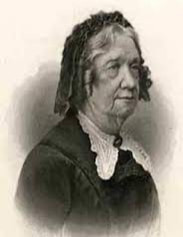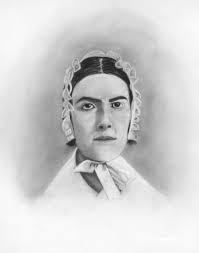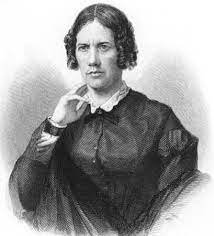|
Catharine Beecher was a proponent of the cult of ‘True Womanhood’. Women, she believed, derived power specifically from domesticity, so that there was no need for political action. She therefore disagreed strongly with Angelina Grimke’s call to women to mobilize against slavery, and in her response to Grimke, An Essay on Slavery and Abolitionism (1837), she wrote: Woman is to win every thing by peace and love; by making herself so much respected, esteemed and loved, that to yield to her opinions and to gratify her wishes, will be the free-will offering of the heart. The kind of direct political action Grimke recommended - petitioning Congress - could jeopardize the influence that women had already achieved and any future progress they might make. To illustrate what she saw as the inherent wrongness of Grimke’s abolitionist writings, she cited the example of another woman writer and activist, Frances Wright. Frances Wright, a Scottish philosopher who emigrated to America and attempted experiments to abolish slavery and extend republican rights to women went counter to everything Beecher believed in. Not only does she step out into the public sphere, but she stands on a stage: ‘If the female advocate chooses to come upon a stage, and expose her person, her dress, and elocution to public criticism, it is right to express disgust at whatever is offensive and indecorous, as it is to criticize the book of an author.’ (Essay on Slavery, 121) Beecher had previously expanded on what see found ‘offensive and indecorous’ in Wright’s public appearances in her Letters on the Difficulty of Religion (1836). The ‘appropriate character of a woman’ she says, ‘demands delicacy of appearance and manners, refinement of sentiment, gentleness of speech, modesty in feeling and action, a shrinking from notoriety and public gaze, a love of dependence, and protection, aversion to all that is coarse and rued, and an instinctive abhorrence of all that tends to indelicacy and impurity, either in principles or actions.’ (22) Fanny Wright fails on all these counts, because of her looks, her demeanour and her actions: ‘with her great masculine person, her loud voice, her untasteful attire, going about unprotected, and feeling no need of protection, mingling with men in stormy debate, and standing up with bare-faced impudence, to lecture to a public assembly. And what are the topics of her discourse, that in some cases may be a palliation for such indecorum? Nothing better than broad attacks on all those principles that protect the purity, the dignity, and the safety of her sex. There she stands, with brazen front and brawny arms, attacking the safeguards of all that is venerable and sacred in religion, all that is safe and wise in law, all that is pure and lovely in domestic virtue.’ (23). Beecher was very invested in arguing for women’s domestic power - to the extent where one feels that for her, a good housewife could manipulate the world of politics from afar, righting wrongs without stepping out of her sphere. Part of her investment was educational. She taught, she started her own school, and she defended in writing (white) women’s right to education, and argued that domestic science ought to be taught properly, so that women would not suffer or cause others to suffer when put in charge of a family’s welfare.
To be a woman, for Beecher, came to mean being an expert in domestic science, a keeper of health, morals, safety and general well-being. But in these earlier writings, it also means looking a certain way. Part of what is wrong with Fanny Wright is that she is physically, mentally and emotionally not fragile enough. She can stand up for herself, and does not need to ‘lean on an arm of flesh, to sit as a doll […] to be admired for her personal charms’ (Angelina Grimke, Letter to Catharine Beecher XII, 2 October 1837). Fanny Wright looks too manly, she holds herself too straight, her muscles are too big, too apparent. She is crossing a visible line between femininity and masculinity, one meant to safeguard the distinctions of the spheres: for after, all, why would a woman who ‘feels no need of protection’ stay inside her home?
0 Comments
|
AboutThis is where I blog about my new book project (under contract with OUP): a history of the philosophy of the home and domesticity, from the perspective of women philosophers. Archives
March 2024
Categories |
Proudly powered by Weebly



 RSS Feed
RSS Feed